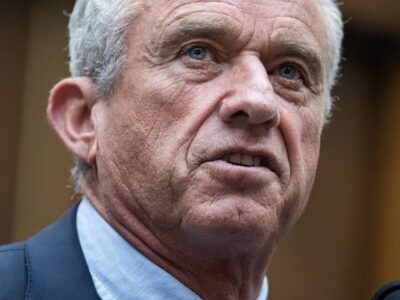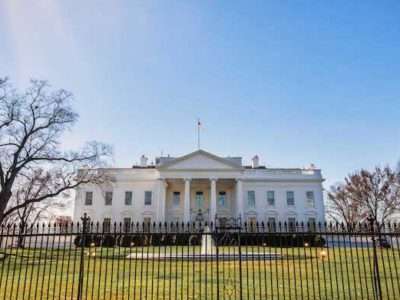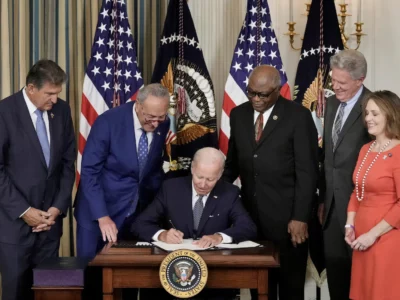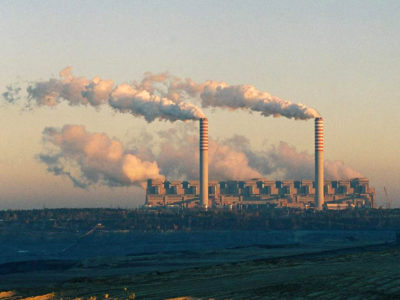Federal Climate Policy
35 Major Climate Initiatives Under Biden
By any measure, it has been an eventful four years for climate policy, with billions in spending and many major regulations finalized. Here’s a timeline of the Top 30 actions.
In light of President Biden’s withdrawal from the 2024 presidential race yesterday, we thought it was appropriate to update this piece about the climate legacy of the Biden-Harris Administration. In his four years in office, Donald Trump rolled back essentially every existing federal policy to limit climate change. The picture under the Biden Administration has …
Continue reading “35 Major Climate Initiatives Under Biden”
CONTINUE READINGHillary Clinton, Climate Change, and the ‘Sliding Doors’ of History
Here’s what could have happened instead of Trump’s crusade against climate action, if Clinton had squeaked out a victory in 2016.
If Hillary Clinton had won, we would be much further along today in the battle to cut carbon emissions and control climate change. Instead, Trump was a climate disaster. The bottom line: Elections do matter. Not just for politicians but for all of us.
CONTINUE READINGPouring Gas on a Five Alarm Fire
That’s Trump’s climate policy in a nutshell. His campaign slogan should be, “Burn, Baby, Burn.”
At a dinner for oil industry CEOs last week, Trump promised to fulfill the industry’s every dream in return for a billion dollars in donations. We urgently need now is more federal climate action, not less. Yet the reelection of Donald Trump would wipe out years of federal climate action. It’s important to understand fully …
Continue reading “Pouring Gas on a Five Alarm Fire”
CONTINUE READINGCould Trump Cancel the IRA?
Probably not. But also possibly yes.
The Inflation Reduction Act is Biden’s signature climate initiative. Trump has already called for repealing it, and so have some Republicans in Congress. Given the IRA’s huge cuts in carbon emissions, that would be a tragedy. Can he do that? He would certainly face some very significant barriers. Trump would need Republican majorities in the …
Continue reading “Could Trump Cancel the IRA?”
CONTINUE READINGFilling in the Picture: The Latest From Kennedy about Climate
Here’s what Kennedy says about his campaign, its effect on the race, and climate change.
Some of RFK Jr.’s views about climate change may be what you expected. Others may surprise you, like his embrace of natural gas as a fuel and his reservations about regulating emissions.
CONTINUE READINGShanahan, Kennedy and Climate Change: Unanswered Questions
It’s clear that RFK Jr.’s running mate has good intentions and an interest in climate issues. But not much is clear beyond that.
Nicole Shanahan seems to care about climate change. But neither she nor RFK Jr. have told us their climate plan. And they haven’t explained why we should take the risk of another four years of Trump rollbacks.
CONTINUE READINGRanking Presidents on Climate Change
Seven presidents, seven very different legacies.
Although a 1977 memo alerted Jimmy Carter to the problem of climate change, the first tentative responses to climate change didn’t emerge until he left the White House. Since then, there have been seven very different men in the White House. You may find the rankings surprising. Here’s how I would rank them, from best …
Continue reading “Ranking Presidents on Climate Change”
CONTINUE READINGI ♥ IRA
Yes, the IRA has flaws. But it was a really unexpected breakthrough for US climate policy.
Call me eccentric, but this is my Valentine to a federal statute, the Inflation Reduction Act, better known as the IRA. No one really expected IRA to pass. A version of the Green New Deal had passed the House. But the Democrats had only a one-vote margin in the Senate, and that one vote was …
CONTINUE READINGHave We Begun the Third Age of Climate Law?
Some thoughts for Environmental History Week.
An international agreement in 1992 committed the world’s nations to addressing climate change but contained few specifics. The US ratified that agreement, but there was little concrete action here through the end of the 20th Century. As this century began, things looked optimistic, with both presidential candidates favoring reductions in carbon emissions. Promptly after taking …
Continue reading “Have We Begun the Third Age of Climate Law?”
CONTINUE READINGThe Biden Power Plant Rule and the Major Question Doctrine
The new rule has hardly any of the features that caused the Supreme Court to strike down the Obama rule.
We’ve already started to hear claims that the Biden power plant rule falls under the major question doctrine, which the Supreme Court used to strike down Obama’s Clean Power Plan. Are those claims plausible? Consider the aspects of the Clean Power Plan that the Supreme Court found objectionable. I’ve identified eight factors that the Court …
Continue reading “The Biden Power Plant Rule and the Major Question Doctrine”
CONTINUE READING












